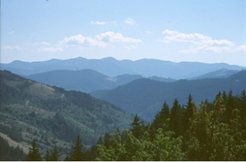Forest Restitution and Resource Management in the Rhodope Mountains, Bulgaria

Forests cover 70 percent of the central Rhodopelandscape.
This research project investigates the ownership, use, and management of forest resources in postsocialist Bulgaria following the forest reprivatization that was authorized by the country's National Assembly in November 1997. Forests occupy about one-third of Bulgaria's territory, and they are an important source of subsistence goods for rural residents -- for example, firewood, construction material, mushrooms, and medicinal plants -- as well as a source of wage employment or cash through their commercial exploitation (e.g., for timber and industrial fiber). Before nationalization of the country's forests in 1947, about 16 percent were owned by private individuals, although the percentage varied by region. Other non-state forests were owned by legal persons, such as churches or schools, or by municipalities. The restitution basically returns forests to these pre-nationalization owners, their rightful heirs, or their successors, preferably in the same location as the earlier holdings (a. k. a. according to old real boundaries).
Rather than focusing on a single site, the project takes a comparative and multi-sited approach in examining the forest restitution and its aftermath within a region that has significant amounts of both high quality and private forests. In so doing, it will describe and compare the systems of forest control and use that emerge in several communities in the region and for the different chunks of forest associated with these communities. In addition to this resource-centered approach, an examine the aftermath of the restitution from an actor-oriented perspective is planned, that is, its meaning for and the role therein of individuals with different identities in terms of such characteristics as age, gender, religion, place of residence, and magnitude of forest ownership. The project focuses on the central part of the Rhodope Mountains -- an expansive but moderate elevation range located along Bulgaria's southern boarder with Greece -- due to their populated nature, the importance of forest resources to the regional economy, the relatively high share of private forest ownership there (indeed, the highest rate of private forest ownership in the country), and the high quality of the forests. Because of the unique history of forest ownership in this region, an additional case study in the Balkan Mountains may provide a further comparative perspective. Theoretically this project seeks to contribute to discussions that relate property regimes to resource management practices and to discussions of the role of social capital and an individual's identity in economic development and resource management.
Some research questions to be explored through the project include the following:
What resource management structures and practices emerge as the forests are restored? (This could include formal legal structures such as forestry cooperatives, as well as more informal community rules about resource access and use.) How do forest owners negotiate the formal legal regulations concerning forest exploitation? How is post-restitution forest management influenced by the larger context for resource exploitation, including access to labor or tools for timber exploitation, the availability of markets, and transportation for the product? What are the contributions of timber exploitation and other uses of the forests to household and regional economies following restitution? How and to what extent does the forest restitution affect local resident's access to non-timber forest resources, firewood, or grazing resources on these lands? What conflicts emerge between the commercial, timber-exploitation focus of the post-restitution forest legislation and subsequent planning for forest management, on the one hand, and the "traditional" or rather pre-restitution patterns of forest use, on the other? How and to what extent do post-restitution forest management and property relations vary on the basis of religious identity, age, gender, place of residence, or holding size
